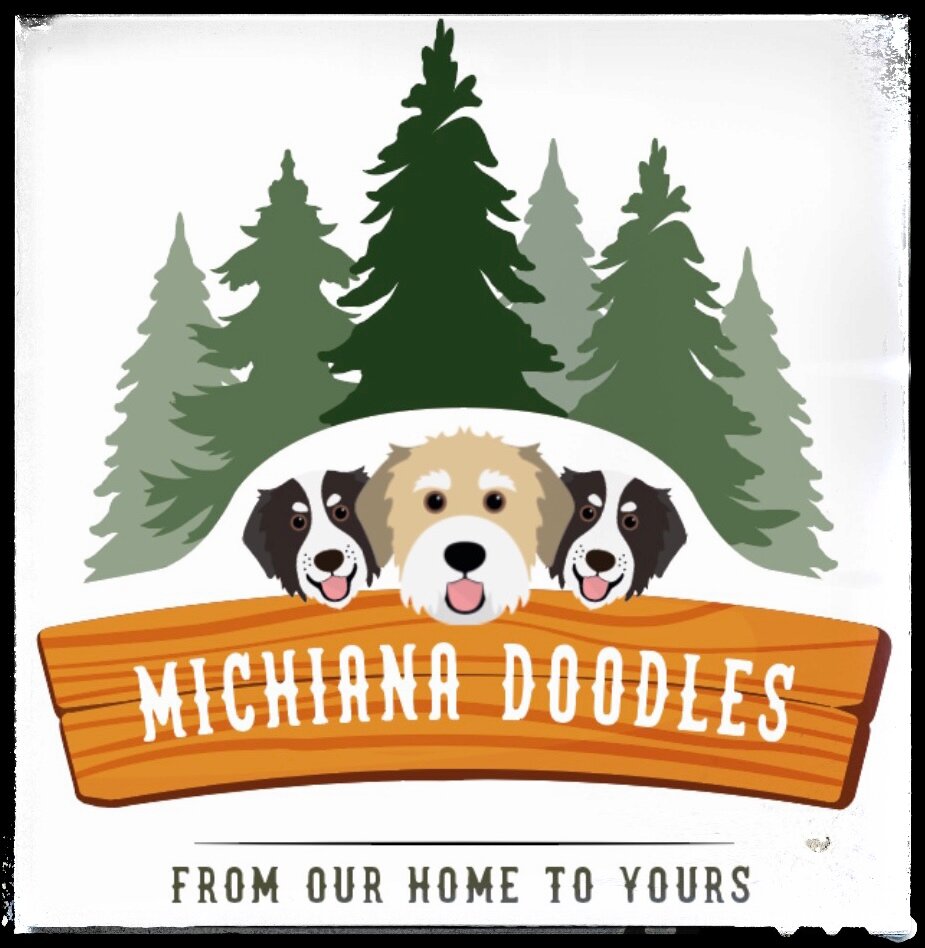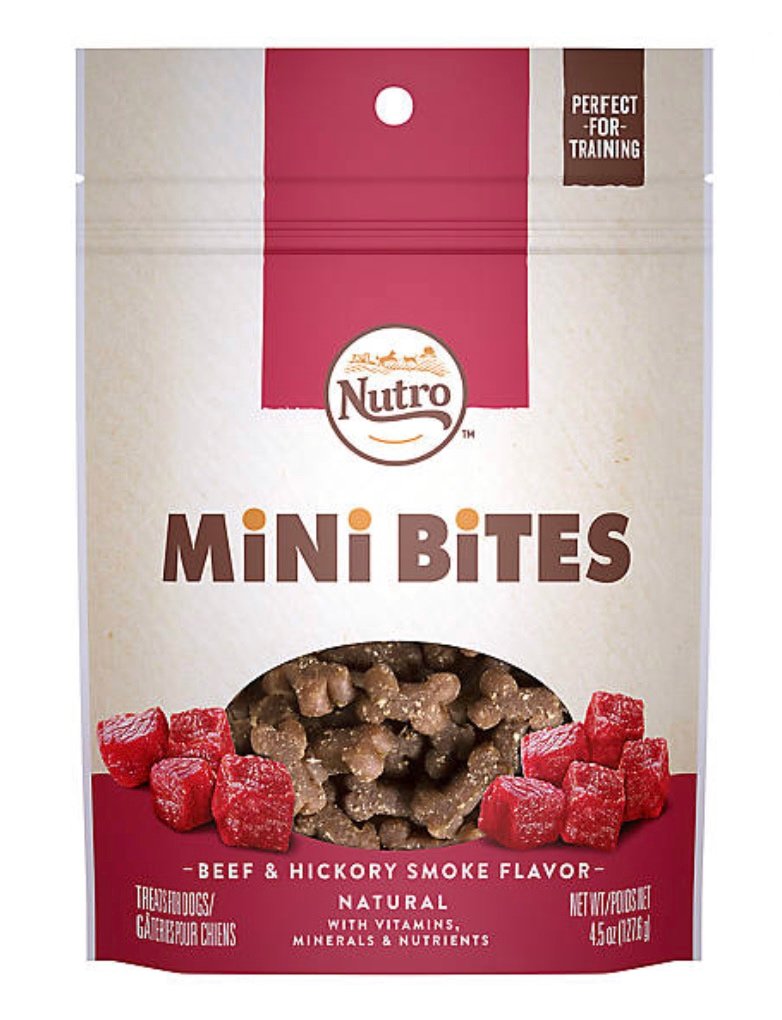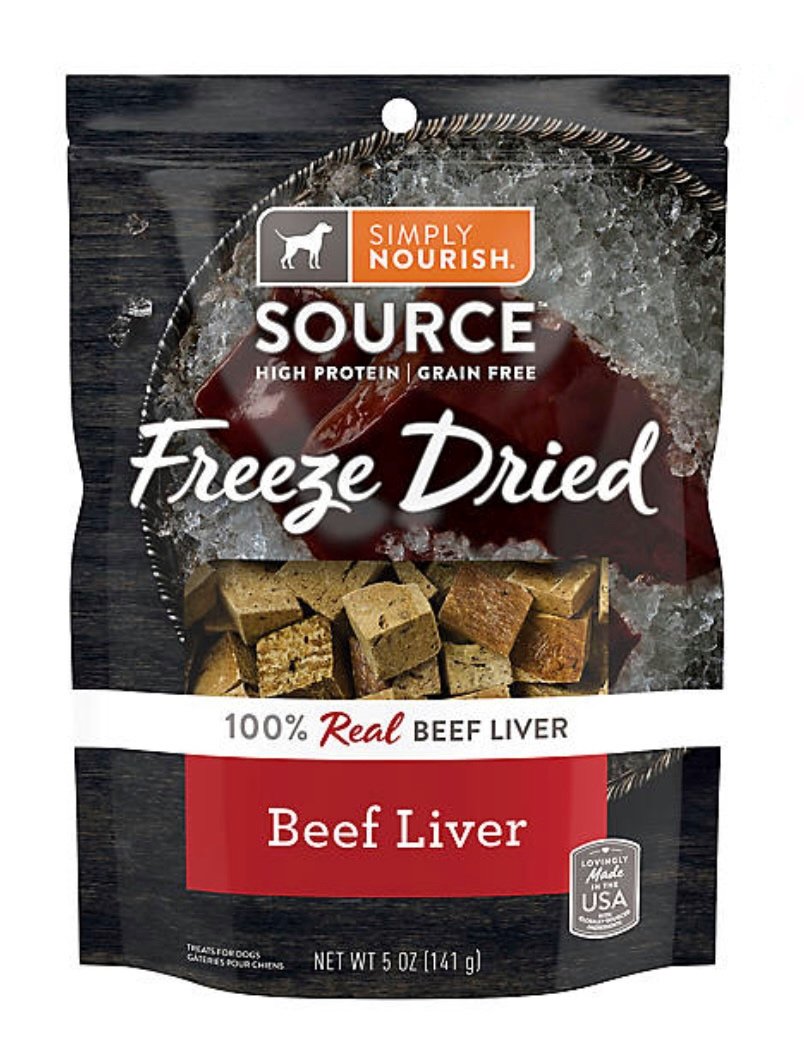FREQUENTLY ASKED QUESTIONS
What is the difference between an F1 and an F1b Labradoodle or Goldendoodle or Bernedoodle?
An F1 Doodle is 50% Poodle and 50% Lab or Golden Retriever or Bernese Mountain Dog. With the F1's we typically get mild to light shedding but rarely no shed. They typically have wispy, wiry or fleece coats that are fairly straight in wave. They are a great choice for families who don't mind some shedding and who have no dog related allergies.
An F1b Doodle is an F1 Doodle bred back to a Poodle. The "b" in the "F1b" stands for "back cross". These are the puppies that we specialize in here at Michiana Doodles! These puppies have coats that range in texture from fleece to wool and the wave ranges from straight to wavy. Our F1b's are typically no shed to very light shedding dogs. These puppies are typically a good choice for families that are looking for a no shed or very light shedding dog and have dog related allergies. We have placed our F1b's successfully in homes with family members that have severe dog allergies.
How big do your F1 and F1b typically get as adults?
Our Standard Labradoodles typically weigh between 45 and 65 pounds as adults. Our Standard Goldendoodles weigh about the same. Our Mini Labradoodles and Goldendoodles typically are in the 15-25 pound range. Our Standard Bernedoodles typically weigh in the 55-70 pound range. Our Mini Bernedoodles typically weigh in the 15-45 pound range depending on the litter. In all of these breeds the females are normally smaller than the males.
Do you have the dew claws removed on your puppies?
No. We believe that we as well as our puppies are all part of God's creation. God gave them dew claws for a reason! If you watch a dog with dew claws you will see that they use them frequently. If they have a bone you will see them grip it with their dew claws. When they run and play their dew claws often touch the ground and actually help to prevent injury. Some researchers are of the opinion that dew claw removal is actually detrimental to the health of a dog. Here is an short article on the subject:
Do the Dew(claws)?
by M. Christine Zink DVM, PhD, DACVSMR
"I work exclusively with canine athletes, developing rehabilitation programs for injured dogs or dogs that required surgery as a result of performance-related injuries. I have seen many dogs now, especially field trial/hunt test and agility dogs, that have had chronic carpal arthritis, frequently so severe that they have to be retired or at least carefully managed for the rest of their careers. Of the over 30 dogs I have seen with carpal arthritis, only one has had dewclaws. If you look at an anatomy book (Miller’s Guide to the Anatomy of Dogs is an excellent one – see Figure 1 below) you will see that there are 2 major, functioning tendons attached to the dewclaw. Of course, at the other end of a tendon is a muscle, and that means that if you cut off the dew claws, there are major muscle bundles that will become atrophied from disuse. Those muscles indicate that the dewclaws have a function. That function is to prevent torque on the leg. Each time the foot lands on the ground, particularly when the dog is cantering or galloping (see Figure 2), the dewclaw is in touch with the ground. If the dog then needs to turn, the dewclaw digs into the ground to support the lower leg and prevent torque. If the dog doesn’t have a dewclaw, the leg twists. A lifetime of that and the result can be carpal arthritis, or perhaps injuries to other joints, such as the elbow, shoulder and toes. Remember: the dog is doing the activity regardless, and the pressures on the leg have to go somewhere. Perhaps you are thinking, “None of my dogs have ever had carpal pain or arthritis.” Well, we need to remember that dogs, by their very nature, do not tell us about mild to moderate pain. If a dog was to be asked by an emergency room nurse to give the level of his pain on a scale from 0 o 10, with 10 being the worst, their scale would be 0, 0, 0, 0, 0, 6, 7, 8, 9, 10. Most of our dogs, especially if they deal with pain that is of gradual onset, just deal with it and don’t complain unless it is excruciating. But when I palpate the carpal joints of older dogs without dewclaws, I frequently can elicit pain with relatively minimal manipulation. As to the possibility of injuries to dew claws. Most veterinarians will say that such injuries actually are not very common at all. And if they do occur, then they are dealt with like any other injury. In my opinion, it is far better to deal with an injury than to cut the dew claws off of all dogs ‘just in case.’ "
If you prefer to have your puppies dew claws removed you are welcome to do so. We recommend that you do this at the same time that he or she is spayed or neutered.
Do you do genetic testing on the dogs in your breeding program?
Yes. The dogs in our breeding program here at Michiana Doodles LLC are all health tested through Embark. From time to time we may use an outside stud to breed to our females. Those studs may be tested through a different company. In addition to this we watch carefully for hereditary health issues. All of our males and females are in excellent health. We have had NO eye issues, NO hip issues and NO elbow issues in ANY of our puppies. We have been breeding Doodles for years and have placed puppies in loving families from coast to coast. We stand behind every puppy that we make available for adoption in regards to genetic or hereditary health issues. Please see our Puppy Contract and Guarantee for more information regarding our 2 year guarantee!
Boy or girl? Male or female? Which one makes the best pet?
We recommend spaying or neutering your puppy at a young age. When this is done the differences between the sexes is minimal. The females do not experience hormonal cycles and the males never develop the hormone driven behaviours such as marking territory, lifting legs to pee or wandering in search females.
Do you recommend Health Insurance for puppies?
Yes. Health insurance can be a godsend should your dog suffer a serious medical emergency of some kind. There are several reputable insurance providers out there. We recommend Trupanion.
Do you recommend crate training?
Yes! It is an effective way to potty train your puppy. It also is way to protect your puppy and your home when you are not around.
How often will my puppy need to be groomed?
Depending on coat type Doodles need to be shaved or cut about 2-3 times a year. This varies depending on coat type and your preference. They typically do need to be combed or brushed on a regular basis. They do not need to be bathed very often. Regular attention to ears and teeth is important!
Will my puppy need additional vaccinations and dewormings after we take him or her home?
Yes. We provide at least 1 5-way vaccination before our puppies leave here. Per recommendation of most vets your puppy will need at least 3 shots prior to 16 weeks. These are typically given 2-4 week intervals. We deworm our puppies starting at 2 weeks and deworm every 2 weeks until 8 weeks. We recommend dewormings at 12 weeks and 16 weeks and then monthly. Despite the fact that your puppy has been dewormed there is no guarantee that your puppy will not have parasites.
Is it possible that my new puppy will have parasites?
Possible yes. Likely no. Giardia and coccidia are both very common parasites that are found in the soil, water or feces of other animals. Giardia is a something that also affects people. You would have no idea that the digestive system issue that you had was due to giardia. But it is possible! The same is true with puppies. They will more than likely be exposed to both of these parasites many times throughout their life. Dog parks, veterinary offices and pet stores are among some of the many places that your dog can encounter them.
Most dogs are asymptomatic carriers and only during times of stress will their systems be unable to combat the parasite. This is when physical symptoms become evident. One of those “high stress” periods is when puppies are transitioning to their new homes.
Our puppies at Michiana Doodles LLC are raised in our home. They are taken out for walks and other activities when the weather permits. They walk over ground where deer, squirrel, rabbits, feral cats and other wild animals frequent. Puppies enjoy these times in the “wild”! These times allow them to experience the outside world. This unfortunately means that it is possible that they will be exposed to real world things like giardia and coccidia.
Our Puppy Contract and Guarantee requires families who adopt puppies from us here at Michiana Doodles LLC to take them to a vet within 3 days of pickup for a health exam. Sometimes the vet will do a fecal exam also. They may test for giardia and coccidia. These tests can show either false positives or false negatives. If your puppy tests positive for giardia they will most likely treat it with fenbendazole or metronidazole. If your puppy tests positive for coccidia your vet will likely treat it with Albon. DO NOT WORRY! These are easily treatable! Without treatment dogs typically develop an immunity to coccidia by the time they reach 12-16 weeks of age.
We love each and every puppy born here and do our best to send happy and healthy puppies home without any issues! Giardia and coccidia are something that most breeders deal with from time to time. Giardia and coccidia are real and common and you will most likely face them at some point while raising your puppy or dog.
What feed will my puppy be on when it leaves Michiana Doodles LLC?
We are now feeding our puppies Purina Pro Plan Chicken and Rice Puppy. If you want to switch to a different food you will need to do so gradually so as not to upset your puppy's delicate digestive system. We have attached a picture of the correct food below!
What toys do you recommend for new puppies?
One of the favorite toys of our dogs are the rope style bones. Also NylaBone offers a number of different products that your puppy will enjoy.
How do I prepare for the arrival of my new puppy?
Make sure you have Purina Pro Plan Chicken and Rice Puppy on hand. (We have attached a picture of the correct food below!)
We also recommend the following:
Appropriately Sized Dog Crate (We like the wire ones with adjustable divider panels)
Shampoo (We use several brands but have a good results with Hartz Groomer’s Best Soothing Oatmeal Shampoo)
Water and Food Bowls
Leash
Collar (Usually an 8-12” size for Standards and 6-10” size for Minis)
Doggy Bed
Stain and Odor Eliminator (For Puppy Accidents)
Slicker Brush
Metal Comb
Dog Treats (We have attached pictures of some good choices below!)
It is also important that you have an appointment scheduled with your vet. This first appointment needs to be within 3 business days of the pickup or delivery of your puppy.
Do you ship your puppies?
We do not ship however we do offer personal delivery! We have placed our puppies in homes from coast to coast. Please ask us about this option!






